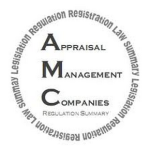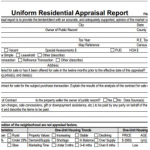Six agencies released a Joint Release “Agencies Issue Proposed Rule on Minimum Requirements for Appraisal Management Companies”. The release, and its attached Proposed Rule, list five AMC requirements that participating States must enforce, as well as six broad powers the States must have related to monitoring, disciplining, and reporting.
The Joint Release also points out to States that participation is not mandatory; non-participation by a State would bar appraisal management companies from doing business in that State related to federally-related transactions.
Read the Joint Release and the Proposed Rule. The Proposed Rule contains instructions for comment.
———————————————————————————————————————-
WASHINGTON— Six agencies today issued a proposed rule that would implement minimum requirements for state registration and supervision of appraisal management companies (AMCs). An AMC is an entity that serves as an intermediary between appraisers and lenders and provides appraisal management services.
In accordance with section 1124 of Title XI of the Financial Institution Reform, Recovery, and Enforcement Act of 1989, as added by section 1473 of the Dodd-Frank Wall Street Reform and Consumer Protection Act, the minimum requirements in the proposed rule would apply to states that elect to establish an appraiser certifying and licensing agency with the authority to register and supervise AMCs.
The proposed rule would not compel a state to establish an AMC registration and supervision program, and there is no penalty imposed on a state that does not establish a regulatory structure for AMCs. However, an AMC is barred by section 1124 from providing appraisal management services for federally related transactions in a state that has not established such a regulatory structure.
Under the proposed rule, participating states would require that an AMC:
Register in the state and be subject to its supervision;
Use only state-certified or licensed appraisers for federally related transactions, such as real estate-related financial transactions overseen by a federal financial institution regulatory agency that require appraiser services;
Require that appraisals comply with the Uniform Standards of Professional Appraisal Practice;
Ensure selection of a competent and independent appraiser; and
Establish and comply with processes and controls reasonably designed to ensure that appraisals comply with the appraisal independence standards established under the Truth in Lending Act.
The proposed rule also would require that the certifying and licensing agency of a participating state have certain authorities, including the authority to:
Approve or deny initial AMC registration applications and applications for renewals;
Examine the AMC and require the AMC to submit relevant information to the state;
Verify that the appraisers on the AMC’s appraiser network or panel hold valid state certifications or licenses;
Conduct investigations of AMCs to assess potential violations of appraisal-related laws;
Discipline an AMC that violates appraisal-related laws; and
Report an AMC’s violation of appraisal-related laws, as well as disciplinary and enforcement actions, and other pertinent information about an AMC’s operations to the Appraisal Subcommittee of the Federal Financial Institutions Examination Council.
The proposed rule would provide participating states 36 months after its effective date to implement the minimum requirements. An AMC that is a subsidiary of a financial institution and regulated by a federal financial institution regulatory agency is required by section 1124 and the proposed rule to meet the same minimum requirements as other AMCs, although such an AMC is not required to register with a state.
In conjunction with the proposal, the Federal Deposit Insurance Corporation is proposing to rescind appraisal regulations promulgated by the former Office of Thrift Supervision (OTS). The OTS appraisal regulations are duplicative of the FDIC’s appraisal regulations in Part 323. Similarly, in a separate rulemaking, the Office of the Comptroller of the Currency is rescinding appraisal regulations promulgated by the former OTS.
The proposal is being issued jointly by the Office of the Comptroller of the Currency, the Board of Governors of the Federal Reserve System, the Federal Deposit Insurance Corporation, the Consumer Financial Protection Bureau, the Federal Housing Finance Agency, and the National Credit Union Administration.
The Federal Register notice is attached. The agencies are seeking comments from the public on all aspects of the proposal. The public will have 60 days to review and comment on the proposal and the proposed Paperwork Reduction Act analysis. Publication of the proposal in the Federal Register is expected shortly.
Attachment: Minimum Requirements for Appraisal Management Companies – PDF
Media Contacts:
OCC Stephanie Collins (202) 649-6870
Federal Reserve Susan Stawick (202) 452-2955
FDIC Greg Hernandez (202) 898-6984
CFPB Sam Gilford (202) 435-7673
FHFA Corinne Russell (202) 649-3032
NCUA Ben Hardaway (703) 518-6333
PR-21-2014





